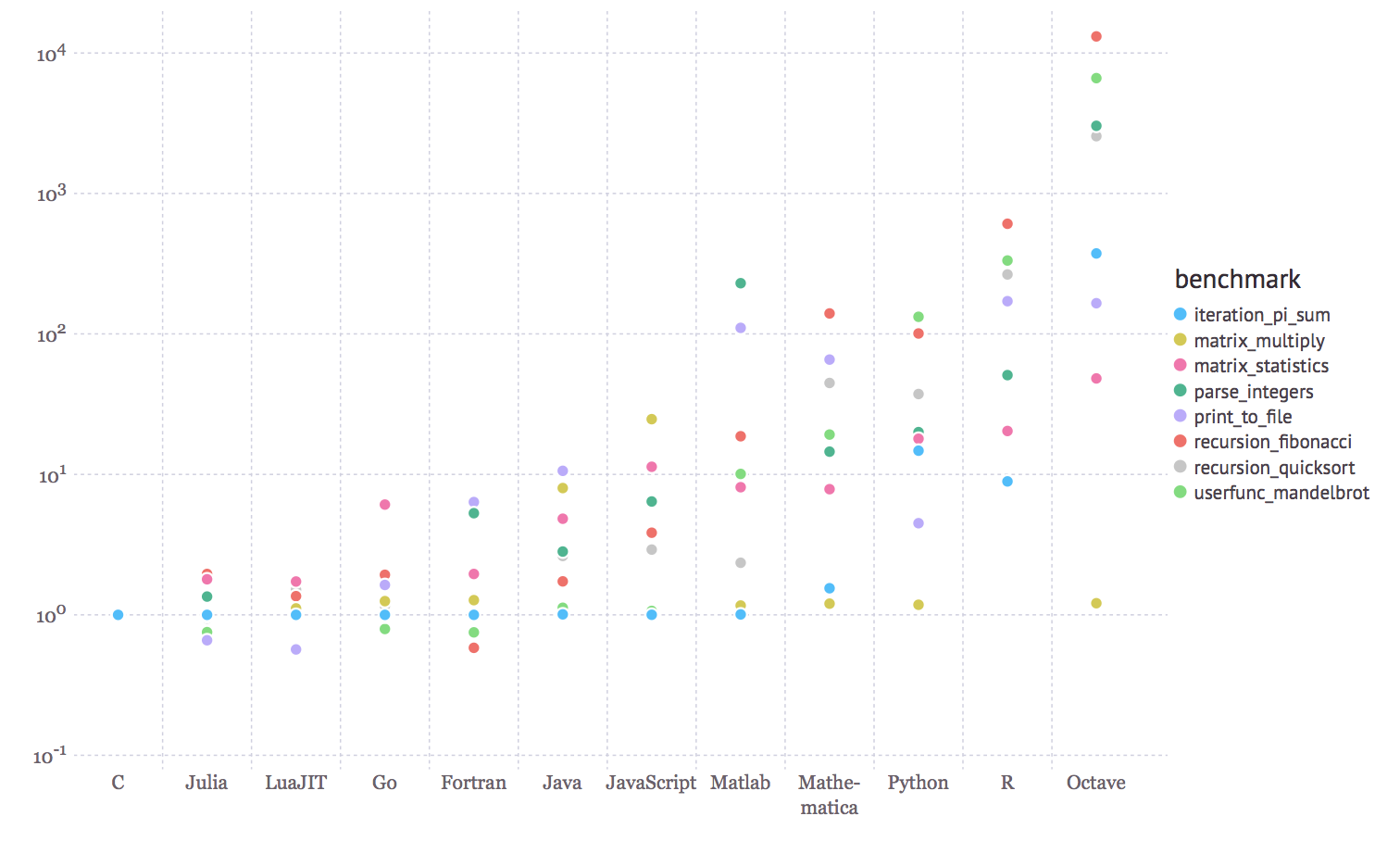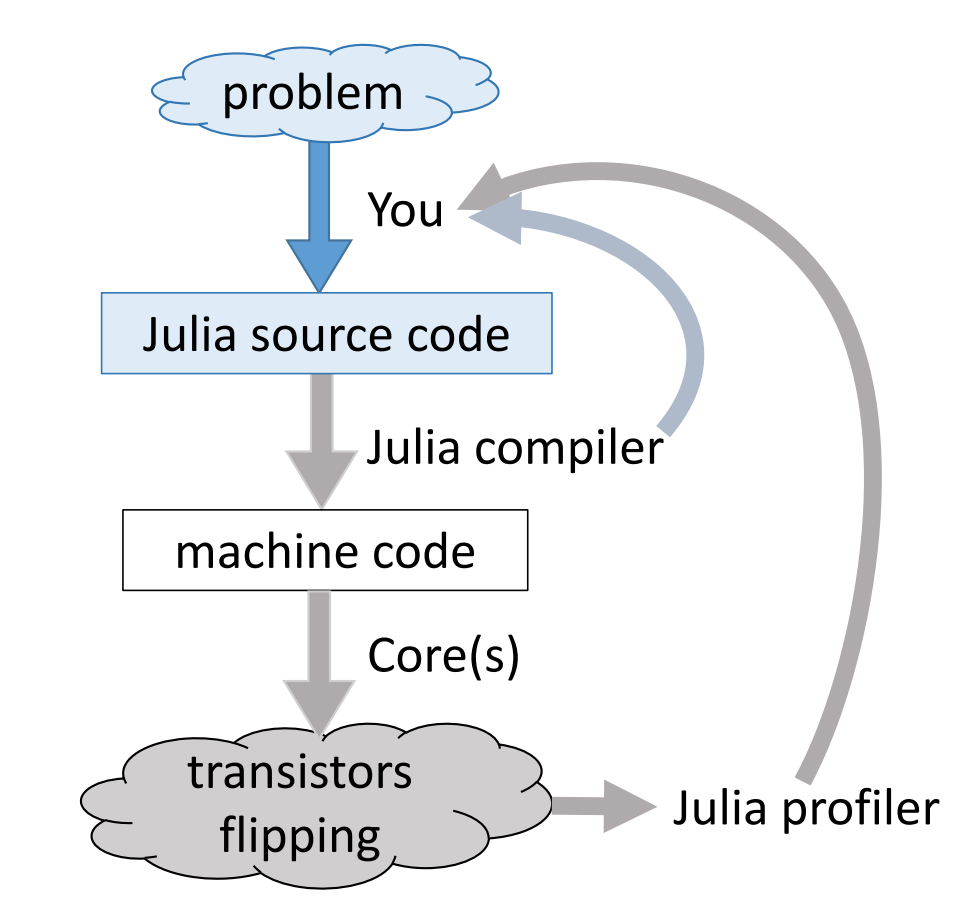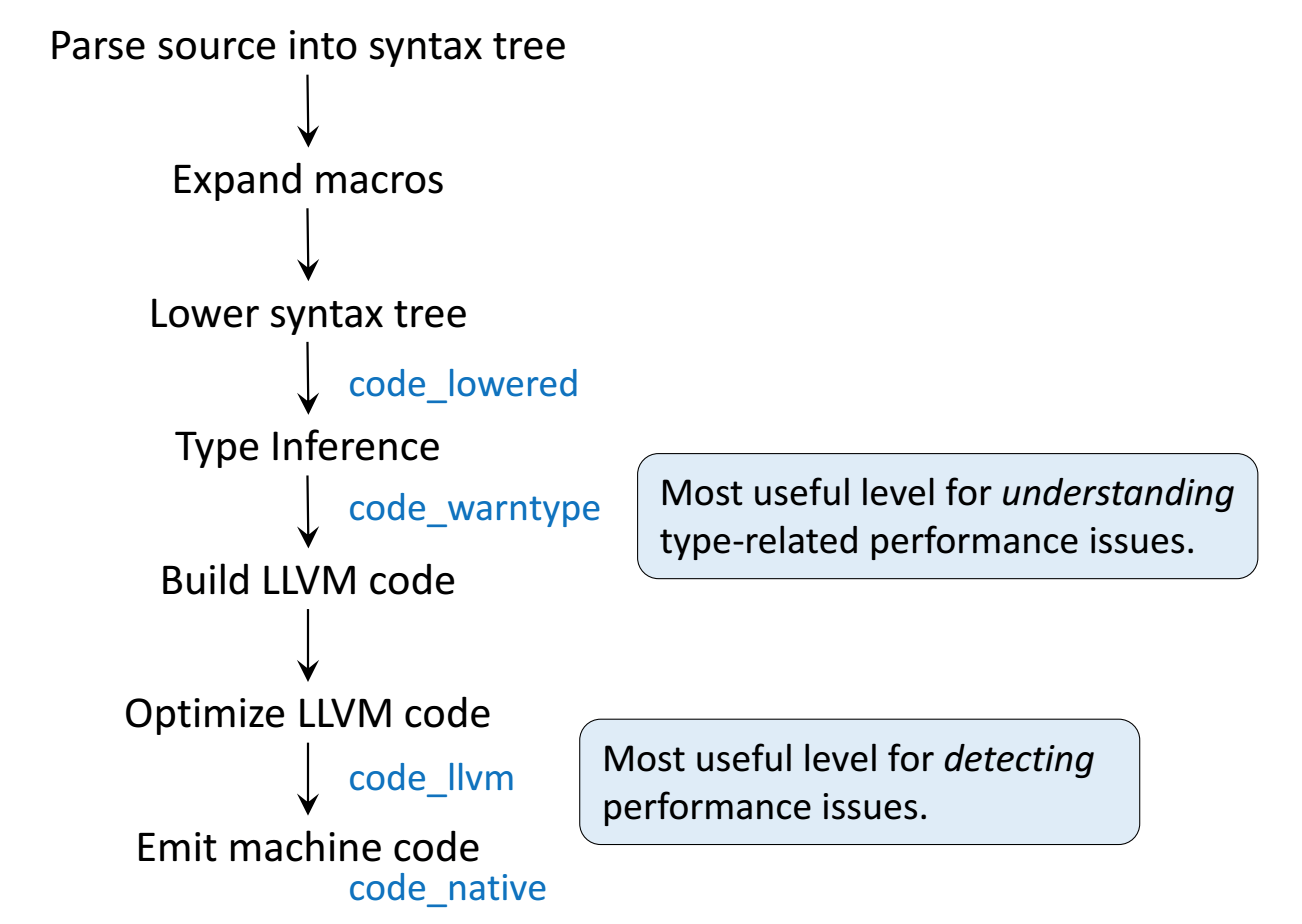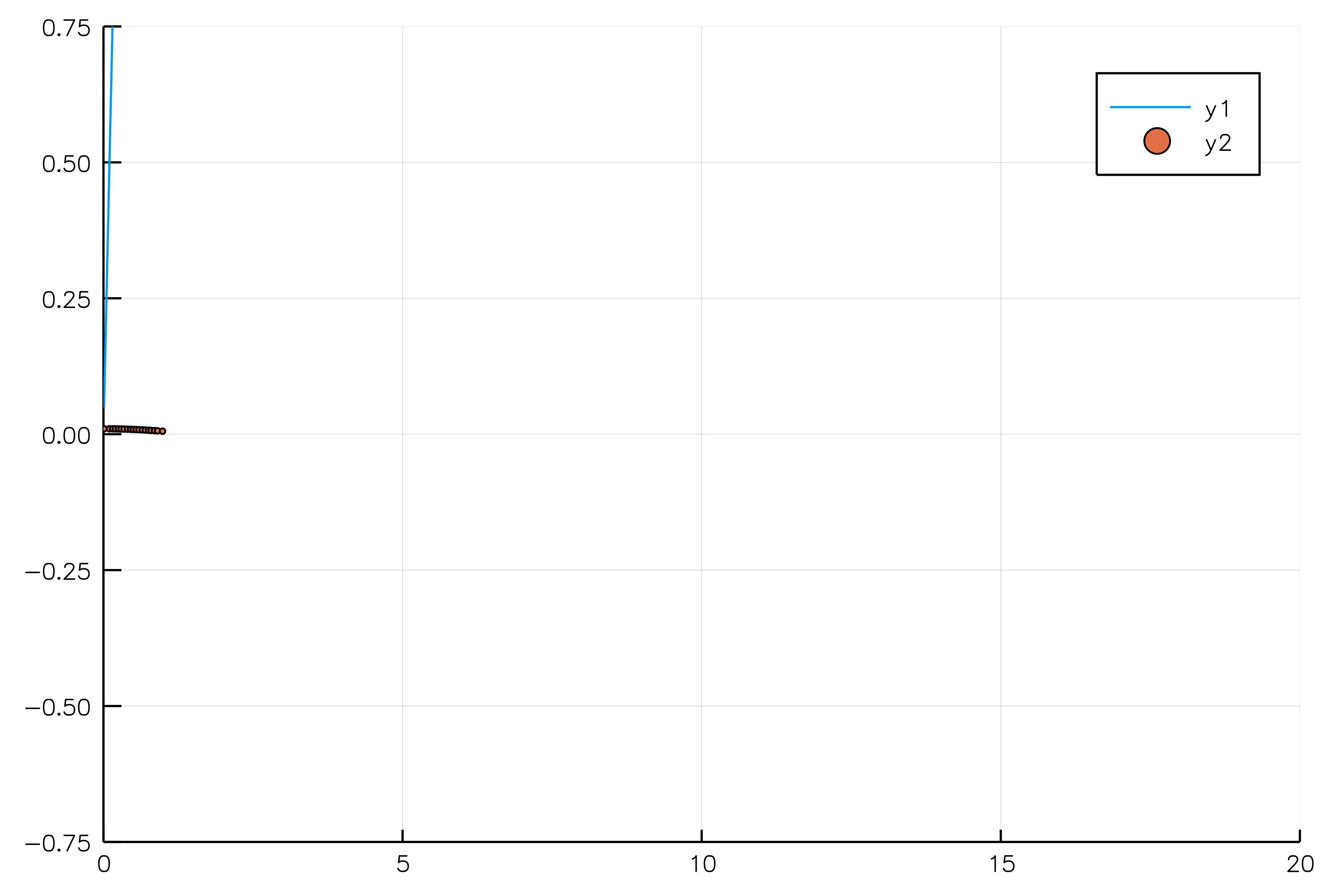Table of Contents¶
Introduction to¶

Types of computer languages¶
Compiled languages: C/C++, Fortran, ...
- Directly compiled to machine code that is executed by CPU
- Pros: fast, memory efficient
- Cons: longer development time, hard to debug
Interpreted language: R, Matlab, Python, SAS IML, JavaScript, ...
- Interpreted by interpreter
- Pros: fast prototyping
- Cons: excruciatingly slow for loops
Mixed (dynamic) languages: Matlab (JIT), R (
compilerpackage), Julia, Cython, JAVA, ...- Pros and cons: between the compiled and interpreted languages
Script languages: Linux shell scripts, Perl, ...
- Extremely useful for some data preprocessing and manipulation
Database languages: SQL, Hadoop.
- Data analysis never happens if we do not know how to retrieve data from databases
Messages¶
To be versatile in the big data era, master at least one language in each category.
To improve efficiency of interpreted languages such as R or Matlab, conventional wisdom is to avoid loops as much as possible. Aka, vectorize code
The only loop you are allowed to have is that for an iterative algorithm.
When looping is necessary, need to code in C, C++, or Fortran.
Success stories: the popularglmnetpackage in R is coded in Fortran.Modern languages such as Julia tries to solve the two language problem. That is to achieve efficiency without vectorizing code.
What's Julia?¶
Julia is a high-level, high-performance dynamic programming language for technical computing, with syntax that is familiar to users of other technical computing environments
Started in 2009. First public release in 2012.
- Creators: Jeff Bezanson, Alan Edelman, Stefan Karpinski, Viral Shah
- Current release v0.6.2
- v1.0 is staged to release in 2018
Aim to solve the notorious two language problem:
- Prototype code goes into high-level languages like R/Python, production code goes into low-level language like C/C++
Walks like Python. Runs like C.
- Prototype code goes into high-level languages like R/Python, production code goes into low-level language like C/C++

Write high-level, abstract code that closely resembles mathematical formulas
- yet produces fast, low-level machine code that has traditionally only been generated by static languages.
Julia is more than just "Fast R" or "Fast Matlab"
- Performance comes from features that work well together.
- You can't just take the magic dust that makes Julia fast and sprinkle it on [language of choice]
R is great, but...¶
It's not meant for high performance computing
- http://adv-r.had.co.nz/Performance.html
- Section on performance starts with "Why is R slow?"
- http://adv-r.had.co.nz/Performance.html
Deficiencies in the core language
- Many fixed with packages (
devtools,roxygen2,Matrix) - Others harder to fix (R uses an old version of BLAS)
- Some impossible to fix (clunky syntax, poor design choices)
- Many fixed with packages (
Only 6 active developers left (out of 20 R-Core members)
- JuliaLang organization has 74 members, with 567 total contributors (as of 3/3/17)
Doug Bates (member of R-Core,
Matrixandlme4)- Getting Doug on board was a big win for statistics with Julia, as he brought a lot of knowledge about the history of R development and design choices
https://github.com/dmbates/MixedModels.jl
As some of you may know, I have had a (rather late) mid-life crisis and run off with another language called Julia.
-- Doug Bates (on the `knitr` Google Group)
Language features of R, Matlab and Julia¶
| Features | R | Matlab | Julia |
|---|---|---|---|
| Open source | 👍 | 👎 | 👍 |
| IDE | RStudio 👍 👍 👍 | 👍 👍 👍 | Atom+Juno 👎 |
| Dynamic document | RMarkdown 👍 👍 👍 | 👍 👍 | Jupyter 👍 👍 |
| Multi-threading | parallel 👎 |
👍 | 👍 👍 see docs |
| JIT | compiler 👎 |
👍 👍 | 👍 👍 👍 |
| Call C/Fortran | wrapper, Rcpp |
wrapper | no glue code needed |
| Call shared library | wrapper | wrapper | no glue code needed |
| Type system | 👎 | 👍 👍 | 👍 👍 👍 |
| Pass by reference | 👎 | 👎 | 👍 👍 👍 |
| Linear algebra | 👎 | MKL, Arpack | OpenBLAS, eigpack, or MKL |
| Distributed computing | 👎 | 👍 | 👍 👍 👍 |
| Sparse linear algebra | Matrix package 👎 |
👍 👍 👍 | 👍 👍 👍 |
| Documentation | 👍 | 👍 👍 👍 | 👍 |
| Profiler | 👍 👍 | 👍 👍 👍 | 👍 |
Benchmark¶
Benchmark code
R-benchmark-25.Rfrom http://r.research.att.com/benchmarks/R-benchmark-25.R covers many commonly used numerical operations used in statistics.We ported to Matlab and Julia and report the run times (averaged over 5 runs) here.
| Test | R 3.4.3 | Matlab R2017a | Julia 0.6.2 |
|---|---|---|---|
| Matrix creation, trans., deform. (2500 x 2500) | 0.65 | 0.13 | 0.21 |
Power of matrix (2400 x 2400, A.^1000) |
0.18 | 0.10 | 0.18 |
| Quick sort ($n = 7 \times 10^6$) | 0.75 | 0.30 | 0.65 |
| Cross product (2800 x 2800, $A^TA$) | 15.02 | 0.18 | 0.23 |
| LS solution ($n = p = 2000$) | 7.00 | 0.07 | 0.06 |
| FFT ($n = 2,400,000$) | 0.32 | 0.03 | 0.04 |
| Eigen-values ($600 \times 600$) | 0.75 | 0.22 | 0.26 |
| Determinant ($2500 \times 2500$) | 3.77 | 0.19 | 0.14 |
| Cholesky ($3000 \times 3000$) | 5.54 | 0.08 | 0.17 |
| Matrix inverse ($1600 \times 1600$) | 4.13 | 0.11 | 0.14 |
| Fibonacci (vector calculation) | 0.23 | 0.16 | 0.27 |
| Hilbert (matrix calculation) | 0.27 | 0.07 | 0.06 |
| GCD (recursion) | 0.42 | 0.09 | 0.16 |
| Toeplitz matrix (loops) | 0.32 | 0.0012 | 0.0007 |
| Escoufiers (mixed) | 0.30 | 0.15 | 0.14 |
Machine specs: Intel i7 @ 2.9GHz (4 physical cores, 8 threads), 16G RAM, Mac OS 10.13.3.
Gibbs sampler example by Doug Bates¶
An example from Dr. Doug Bates's slides Julia for R Programmers.
The task is to create a Gibbs sampler for the density
$$ f(x, y) = k x^2 exp(- x y^2 - y^2 + 2y - 4x), x > 0 $$ using the conditional distributions $$ \begin{eqnarray*} X | Y &\sim& \Gamma \left( 3, \frac{1}{y^2 + 4} \right) \\ Y | X &\sim& N \left(\frac{1}{1+x}, \frac{1}{2(1+x)} \right). \end{eqnarray*} $$This is a Julia function for the simple Gibbs sampler:
using Distributions
function jgibbs(N, thin)
mat = zeros(N, 2)
x = y = 0.0
for i in 1:N
for j in 1:thin
x = rand(Gamma(3.0, 1.0 / (y * y + 4.0)))
y = rand(Normal(1.0 / (x + 1.0), 1.0 / sqrt(2.0(x + 1.0))))
end
mat[i, 1] = x
mat[i, 2] = y
end
mat
end
Generate a bivariate sample of size 10,000 with a thinning of 500. How long does it take?
jgibbs(100, 5); # warm-up
@elapsed jgibbs(10000, 500)
- R solution. The
RCall.jlpackage allows us to execute R code without leaving theJuliaenvironment. We first define an R functionRgibbs().
using RCall
R"""
library(Matrix)
Rgibbs <- function(N, thin) {
mat <- matrix(0, nrow=N, ncol=2)
x <- y <- 0
for (i in 1:N) {
for (j in 1:thin) {
x <- rgamma(1, 3, y * y + 4) # 3rd arg is rate
y <- rnorm(1, 1 / (x + 1), 1 / sqrt(2 * (x + 1)))
}
mat[i,] <- c(x, y)
}
mat
}
"""
and then generate the same number of samples
# benchmark
@elapsed R"""
system.time(Rgibbs(10000, 500))
"""
We see 40-80 fold speed up of Julia over R on this example, without extra coding effort!
Learning resources¶
- Intro to Julia (1h40m), by Jane Herriman (Dec 19, 2017), and next (monthly) tutorial
Intro to Julia, by Jane Herriman on April 6, 2018 at 10AM PDT. - Cheat sheet: The Fast Track to Julia.
- Browse the
Juliadocumentation. - For Matlab users, read Noteworthy Differences From Matlab.
For R users, read Noteworthy Differences From R.
For Python users, read Noteworthy Differences From Python. - The Learning page on Julia's website has pointers to many other learning resources.
Julia REPL (Read-Evaluation-Print-Loop)¶
The Julia REPL, or Julia shell, has four main modes.
Default mode is the Julian prompt
julia>. Type backspace in other modes to enter default mode.Help mode
help?>. Type?to enter help mode.?search_termdoes a fuzzy search forsearch_term.Shell mode
shell>. Type;to enter shell mode.Search mode
(reverse-i-search). Pressctrl+Rto enter search model.With
RCall.jlpackage installed, we can enter the R mode by typing$(shift+4) at Julia REPL.
Some survival commands in Julia REPL:
quit()orCtrl+D: exit Julia.Ctrl+C: interrupt execution.Ctrl+L: clear screen.whos(): list all variables in current workspace.workspace(): clear all variables and reset session.Append
;(semi-colon) to suppress displaying output from a command.include("filename.jl")to source a Julia code file.
Seek help¶
Online help from REPL:
?function_name.Google (of course).
Julia documentation: https://docs.julialang.org/en/stable/.
Look up source code:
@edit func(x).Friends.
Which IDE?¶
I highly recommend the editor Atom with packages
julia-client,language-julia, andlatex-completionsinstalled.If you want RStudio- or Matlab- like IDE, install the
uber-junopackage in Atom. Follow instructions at https://github.com/JunoLab/uber-juno/blob/master/setup.md.JuliaPro bundles Julia, Atom, Juno, and many commonly used packages.
For homework, I recommend Jupyter Notebook.
Also worth trying is JupyterLab, which is supposed to replace Jupyter Notebook after it reaches v1.0.
Julia package system¶
Each Julia package is a Git repository. Each Julia package name ends with
.jl. E.g.,Distributions.jlpackage lives at https://github.com/JuliaStats/Distributions.jl.
Google search withPackageName.jlusually leads to the package on github.com.The package ecosystem is rapidly maturing; a complete list of registered packages (which are required to have a certain level of testing and documentation) is at http://pkg.julialang.org/.
For example, the package called
Distributions.jlis added withPkg.add("Distributions") # no .jl
and "removed" (although not completely deleted) with
Pkg.rm("Distributions")
The package manager provides a dependency solver that determines which packages are actually required to be installed.
Non-registered packages are added by cloning the relevant Git repository. E.g.,
Pkg.clone("git@github.com:OpenMendel/SnpArrays.jl.git")
A package needs only be added once, at which point it is downloaded into your local
.julia/vx.xdirectory in your home directory.
;ls -l /Users/huazhou/.julia/v0.6 "|" head -20
- Directory of a specific package can be queried by
Pkg.dir():
Pkg.dir("Distributions")
If you start having problems with packages that seem to be unsolvable, you can try just deleting your .julia directory and reinstalling all your packages.
For JuliaPro, the packages are downloaed to directory
/Applications/JuliaPro-0.6.2.2.app/Contents/Resources/pkgs-0.6.2.2/v0.6/.Periodically, one should run
Pkg.update(), which checks for, downloads and installs updated versions of all the packages you currently have installed.Pkg.status()lists the status of all installed packages.Using functions in package.
using Distributions
This pulls all of the exported functions in the module into your local namespace, as you can check using the
whos()command. An alternative isimport Distributions
Now, the functions from the Distributions package are available only using
Distributions.<FUNNAME>
All functions, not only exported functions, are always available like this.
# Pkg.add("RCall")
using RCall
x = randn(1000)
R"""
hist($x, main="I'm plotting a Julia vector")
"""
R"""
library(ggplot2)
qplot($x)
"""
x = R"""
rnorm(10)
"""
y = collect(x)
Access Julia variables in R REPL mode:
julia> x = rand(5) # Julia variable R> y <- $x
Pass Julia expression in R REPL mode:
R> y <- $(rand(5))
Put Julia variable into R environment:
julia> @rput x R> x
Get R variable into Julia environment:
R> r <- 2 Julia> @rget r
If you want to call Julia within R, check out the
XRJuliapackage by John Chambers.
Some basic Julia code¶
y = 1
typeof(y) # same as int in R
y = 1.0
typeof(y) # same as double in R
# Greek letters: `\pi<tab>`
π
# Greek letters: `\theta<tab>`
θ = y + π
# emoji! `\:kissing_cat:<tab>`
😽 = 5.0
α̂ = π
# vector of Float64 0s
x = zeros(5)
# vector Int64 0s
x = zeros(Int, 5)
# matrix of Float64 0s
x = zeros(5, 3)
# matrix of Float64 1s
x = ones(5, 3)
# define array without initialization
x = Array{Float64}(5, 3)
# fill a matrix by 0s
fill!(x, 0)
# initialize an array to be 2.5
fill(π, (5, 3))
a = 3//5
typeof(a)
b = 3//7
a + b
# uniform [0, 1) random numbers
x = rand(5, 3)
# uniform random numbers (in single precision)
x = rand(Float16, 5, 3)
# random numbers from {1,...,5}
x = rand(1:5, 5, 3)
# standard normal random numbers
x = randn(5, 3)
# range
1:10
typeof(1:10)
1:2:10
typeof(1:2:10)
# integers 1-10
x = collect(1:10)
# Float64 numbers 1-10
x = collect(1.0:10)
# convert to a specific type
convert(Vector{Float64}, 1:10)
Timing and benchmark¶
@time, @elapsed, @allocated macros:
srand(123) # seed
x = randn(10000)
@time sum(x) # first run includes compilation time
@time sum(x) # no compilation time after first run
@elapsed sum(x)
@allocated sum(x)
Use BenchmarkTools.jl for more robust benchmarking. Analog of microbenchmark package in R.
using BenchmarkTools
@benchmark sum(x)
R"""
library(microbenchmark)
microbenchmark(sum($x))
"""
Matrices and vectors¶
Dimensions¶
x = randn(5, 3)
size(x)
size(x, 1) # nrow() in R
size(x, 2)
# total number of elements
length(x)
Indexing¶
# 5 × 5 matrix of random Normal(0, 1)
x = randn(5, 5)
# first column
x[:, 1]
# first row
x[1, :]
# sub-array
x[1:2, 2:3]
# getting a subset of a matrix creates a copy, but you can also create "views"
z = view(x, 1:2, 2:3)
z[2, 2] = 0.0
x
# y points to same data as x
y = x
# x and y point to same data
pointer(x), pointer(y)
# changing y also changes x
y[:, 1] = 0
x
# create a new copy of data
z = copy(x)
pointer(x), pointer(z)
Concatenate matrices¶
x, y, z = randn(5, 3), randn(5, 2), randn(3, 5)
M = [x y]
M = [x y; z]
Dot operation¶
Dot operation in Julia is elementwise operation.
x = randn(5, 3)
y = ones(5, 3)
x .* y # same x * y in R
x .^ (-2)
sin.(x)
Basic linear algebra¶
x = randn(5)
# vector L2 norm
vecnorm(x)
y = randn(5) # another vector
# dot product
dot(x, y) # x' * y
x'y
x, y = randn(5, 3), randn(3, 2)
# matrix multiplication, same as %*% in R
x * y
x = randn(3, 3)
# conjugate transpose
x'
b = rand(3)
x'b # same as x' * b
trace(x)
det(x)
rank(x)
Sparse matrices¶
# 10-by-10 sparse matrix with sparsity 0.1
X = sprandn(10, 10, .1)
# convert to dense matrix; be cautious when dealing with big data
Xfull = full(X)
# convert a dense matrix to sparse matrix
sparse(Xfull)
# syntax for sparse linear algebra is same as dense linear algebra
β = ones(10)
X * β
# many functions apply to sparse matrices as well
sum(X, 2)
Control flow and loops¶
if-elseif-else-end
if condition1 # do something elseif condition2 # do something else # do something end
forloopfor i in 1:10 println(i) end
Nested
forloop:for i in 1:10 for j in 1:5 println(i * j) end end
Same as
for i in 1:10, j in 1:5 println(i * j) end
Exit loop:
for i in 1:10 # do something if condition1 exit # skip remaining loop end end
Exit iteration:
for i in 1:10 # do something if condition1 continue # skip to next iteration end # do something end
Functions¶
In Julia, all arguments to functions are passed by reference, in contrast to R and Matlab.
Function names ending with
!indicates that function mutates at least one argument, typically the first.sort!(x) # vs sort(x)
Function definition
function func(req1, req2; key1=dflt1, key2=dflt2) # do stuff return out1, out2, out3 end
Required arguments are separated with a comma and use the positional notation.
Optional arguments need a default value in the signature.
Semicolon is not required in function call.
return statement is optional.
Multiple outputs can be returned as a tuple, e.g.,return out1, out2, out3.Anonymous functions, e.g.,
x -> x^2, is commonly used in collection function or list comprehensions.map(x -> x^2, y) # square each element in x
Functions can be nested:
function outerfunction() # do some outer stuff function innerfunction() # do inner stuff # can access prior outer definitions end # do more outer stuff end
Functions can be vectorized using the Dot syntax:
function myfunc(x)
return sin(x^2)
end
x = randn(5, 3)
myfunc.(x)
Collection function (think this as the series of
applyfunctions in R).Apply a function to each element of a collection:
map(f, coll) # or map(coll) do elem # do stuff with elem # must contain return end
map(x -> sin(x^2), x)
map(x) do elem
elem = elem^2
return sin(elem)
end
# Mapreduce
mapreduce(x -> sin(x^2), +, x)
# same as
sum(x -> sin(x^2), x)
- List comprehension
[sin(2i + j) for i in 1:5, j in 1:3] # similar to Python
Type system¶
When thinking about types, think about sets.
Everything is a subtype of the abstract type
Any.An abstract type defines a set of types
- Consider types in Julia that are a
Number:
- Consider types in Julia that are a

- You can explore type hierarchy with
typeof(),supertype(), andsubtypes().
typeof(1.0), typeof(1)
supertype(Float64)
subtypes(AbstractFloat)
# Is Float64 a subtype of AbstractFloat?
Float64 <: AbstractFloat
# On 64bit machine, Int == Int64
Int == Int64
convert(Float64, 1)
randn(Float32, 5)
convert(Vector{Float64}, randn(Float32, 5))
convert(Int, 1.0)
convert(Int, 1.5) # should use round(1.5)
round(Int, 1.5)
Multiple dispatch¶
Multiple dispatch lies in the core of Julia design. It allows built-in and user-defined functions to be overloaded for different combinations of argument types.
Let's consider a simple "doubling" function:
g(x) = x + x
g(1.5)
This definition is too broad, since some things can't be added
g("hello world")
- This definition is correct but too restrictive, since any
Numbercan be added.
g(x::Float64) = x + x
- This will automatically work on the entire type tree above!
g(x::Number) = x + x
This is a lot nicer than
function g(x)
if isa(x, Number)
return x + x
else
throw(ArgumentError("x should be a number"))
end
end
methods(func)function display all methods defined forfunc.
methods(g)
@which func(x)marco tells which method is being used for argument signaturex.
x = 1
typeof(x)
g(x)
@which g(x)
x = randn(5)
@which g(x)
g(x)
Just-in-time compilation (JIT)¶
Following figures and some examples are taken from Arch D. Robinson's slides Introduction to Writing High Performance Julia.
 |
 |
|---|---|
Julia's efficiency results from its capabilities to infer the types of all variables within a function and then call LLVM to generate optimized machine code at run-time.
workspace() # clear previous definition of g
g(x::Number) = x + x
This function will work on any type which has a method for +.
@show g(2)
@show g(2.0);
This is the abstract syntax tree (AST).
@code_lowered g(2)
Type inference:
@code_warntype g(2)
@code_warntype g(2.0)
Peek at the compiled LLVM bitcode with @code_llvm
@code_llvm g(2)
@code_llvm g(2.0)
We didn't provide a type annotation. But different LLVM code gets generated depending on the argument type!
In R or Python,
g(2)andg(2.0)would use the same code for both.In Julia,
g(2)andg(2.0)dispatches to optimized code forInt64andFloat64, respectively.For integer input
x, LLVM compiler is smart enough to knowx + xis simple shiftingxby 1 bit, which is faster than addition.
Lowest level is the assembly code, which is machine dependent.
@code_native g(2)
@code_native g(2.0)
Profiling Julia code¶
Julia has several built-in tools for profiling. The @time marco outputs run time and heap allocation.
function tally(x)
s = 0
for v in x
s += v
end
s
end
a = rand(10000)
@time tally(a) # first run: include compile time
@time tally(a)
For more robust benchmarking, the BenchmarkTools.jl package is highly recommended.
using BenchmarkTools
@benchmark tally(a)
We see the memory allocation (468.75 KiB, average 10.73% GC) is suspiciously high.
The Profile module gives line by line profile results.
Profile.clear()
@profile tally(a)
Profile.print(format=:flat)
One can use ProfileView package for better visualization of profile data:
using ProfileView
ProfileView.view()
@code_warntype tally(a)
;cat bar.jl
Next, in terminal, we run the script with --track-allocation=user option.
;julia --track-allocation=user bar.jl
The profiler outputs a file bar.jl.mem.
;cat bar.jl.mem
We see line 4 is allocating suspicious amount of heap memory.
Type stability¶
The key to writing performant Julia code is to be type stable, such that Julia is able to infer types of all variables and output of a function from the types of input arguments.
Is the tally function type stable? How to diagnose and fix it?
@code_warntype tally(rand(100))
In this case, Julia fails to infer the type of the reduction variable s, which has to be boxed in heap memory at run time.


This is the generated LLVM bitcode, which is unsually long and contains lots of box:
@code_llvm tally(rand(100))
What's the fix?
function tally2(x)
s = zero(eltype(x))
for v in x
s += v
end
s
end
@benchmark tally2(a)
Much shorter LLVM bitcode:
@code_llvm tally2(a)
Plotting in Julia¶
The three most popular options (as far as I know) in Julia are
- Gadfly.jl
- Julia equivalent of
ggplot2in R
- Julia equivalent of
- PyPlot.jl
- Wrapper for Python's matplotlib
- Plots.jl
- Defines an unified interface for plotting
- maps arguments to different plotting "backends"
- PyPlot, GR, PlotlyJS, and many more
We demonstrate Plots.jl below:
# Pkg.add("Plots")
using Plots
x = cumsum(randn(50, 2), 1);
# Pkg.add("PyPlot")
pyplot() # set the backend to PyPlot
plot(x, title="Random walk", xlab="time")
# Pkg.add("PlotlyJS")
plotlyjs() # change backend to Plotly
plot(x, title="Random walk", xlab="time")
gr() # change backend to GR
plot(x, title="Random walk", xlab="time")
gr()
@gif for i in 1:20
plot(x -> sin(x) / (.2i), 0, i, xlim=(0, 20), ylim=(-.75, .75))
scatter!(x -> cos(x) * .01 * i, 0, i, m=1)
end

versioninfo()

